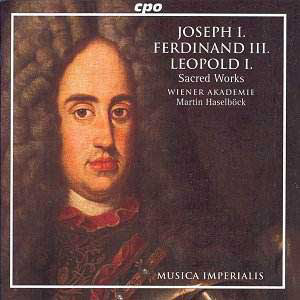This disc presents a choice sample of works from a
generation of emperor-composers at the time of the Holy Roman Empire
of the German Nation (c.1600-1700). The listener is taken on a journey
through a changing century of music from the delicate jewels of Kaiser
Ferdinand III hymns to the sophisticated baroque splendour of the religious
songs and psalms of Kaiser Josephus I and Kaiser Leopold I. Sandwiched
between the royal piety the court musician Johann Heinrich Schmelzer
plays a sweet servant’s lament for the death of his Emperor patron Ferdinand
III.
These works do warrant the high calibre playing that
the Wiener Akademie and the weighty direction of Martin Haselböck
bring to them. A lesser talent may not have brought out the sparkling
character of these pieces. The performance is engaging and faultless,
the choice of singers quite inspired and altogether the disc is satisfyingly
well put together in the meshing of Italianate style and Germanic composition.
The three hymns from Ferdinand III are taken from the
liturgy and include two Christmas and one spring hymn. Ferdinand has
given them their own appropriate religious atmosphere and they are intriguing
and pretty poems. Apparently much influenced by his Italian teacher
Giovanni Valentini and by Monteverdi, who attended his court, the music
of the hymns adorn the simple religious texts with pretty instrumentation
and colotura singing. The hymns display a fascinating transitional moment
in the music of the Baroque era. Flutes, trumpets, cornets and strings
are knotted together bringing a rawer quirkiness to the music which
contrasts with the more sophisticated music of the later Emperors, Leopold
and Josephus. The performers really bring out the majesty of the composition
for wind here and they manage to create a complex feel to the music
in the warm rich tones and the choice of Oratorio style singing.
The soprano Linda Perillo has a rich, slightly coarse
vocal line which sounds very well when set against the trumpet. The
men have a purer and more beautiful quality to their voices, and the
inclusion of a male soprano serves to highlight this.
Haselböck and the Akademie are particularly good
at bringing out the character of the earlier pieces but they go on to
underline the professionalism and sophistication of the later Emperor’s
works.
The Schmelzer piece is dealt with effectively by the
performers. The piece is both graceful and melancholic and yet by turns
becomes quite jaunty. Schmelzer divides the piece into 6 mini movements,
although the piece almost has a tone poem quality to it, as it is obviously
quite descriptive. The composer seems to weave expressions of sorrow
among a description of his master’s character or scenes from his life.
Again it is the rich, sombre tones of the instruments which captivates
here and creates a marvelous feel to the music.
The Schemlzer piece really seems to bridge the gap
between music which still had its roots in renaissance melancholy and
simple, flowing structures and the complexity and assurance of the music
of the Eighteenth century.
The later works of the Josephus and Leopold shows such
assurance. The pieces are deftly composed, almost smug in their early
Eighteenth optimism. Leopold was a prolific composer, whose works included
operas, masses and oratorios and Josephus apparently garnered musical
tributes from his expert contemporaries, although few works by him are
now in existence.
Josephus’ cantata is a pretty Handlerian-like affair
to which Perillo’s voice is most suited and Leopold’s ‘Sonata piena’,
a short instrumental piece for wind and strings, is most grandeous and
kingly. Flourishing baroque trumpets and sweet strings display a worldly
air.
To finish the disc Leopold’s Psalm ‘Laudate Pueri’
is finely sung and the Wiener Akademie Choir add an element of individuality
to the piece through their robust singing. The grand style of the work
is offset by a sort of alpine village choir sound which the Akademie
manage to evoke, which really brings the piece alive. Haselböck
and the Akademie seem to be hinting at the changing nature of the times
–a distinctive Germanic flavour asserting itself over earlier Italian
dominance.
This is, then, a well-played and charming disc. Cleverly
thought out, surprising, and not at all dull, despite being limited
to a particular geographic area and by the high-born status of its composers!
The quality of the recording too underscores the richness in sound of
the musicians.
Ali Rodriguez


